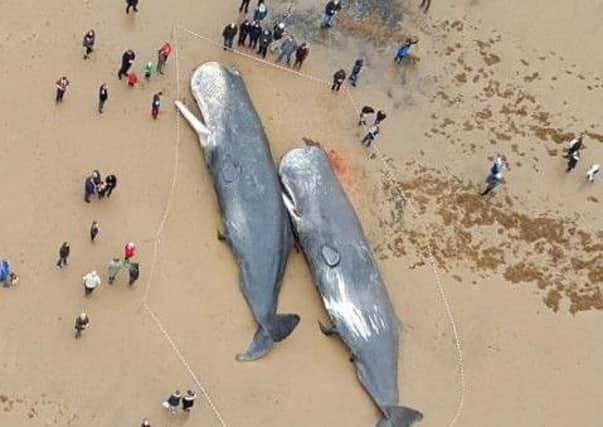What caused the whale strandings and what does it mean for our marine life?


SPERM Whales are the great leviathans of the sea that helped inspire arguably the greatest nautical tale ever written, Herman Melville’s Moby Dick.
But these majestic creatures have been in the news over the past few days for more distressing reasons after five whales, all believed to have been from the same pod, were found washed up off the coast of Norfolk and Lincolnshire.
Advertisement
Hide AdAdvertisement
Hide AdSperm whales are rarely seen in the North Sea and scientists are examining samples taken from their remains to help them work out how they ended up stranded there.
As well as causing a flurry of media interest these giant mammals have also attracted some unwanted attention, so much so that security guards were brought in after anti-nuclear campaigners scribbled messages on at least one of the carcasses, while there have even been reports of people trying to hack at the whales’ teeth to steal as trophies.
It’s believed that the five whales which washed up in England were part of the same pods as the 12 whales that became stranded and died in the Netherlands and Germany last week.
This isn’t the first time that we have seen whales getting beached off our shores. Around 600 large marine mammals become beached in the UK each year, most of them porpoises and dolphins. But in 2014, about 60 bigger whales were stranded, including 20 long-finned pilot whales and 15 minke whales.
Advertisement
Hide AdAdvertisement
Hide AdThe question that marine experts are trying to get to the bottom of now is what caused the sperm whales to become beached. It’s known that they rely on sonar to navigate, sending out sound pulses that help them to form a clear picture of their underwater world. However, this doesn’t work on a shallow seabed, like that found around our North Sea coast, and the whales quickly become disorientated.
If they end up getting stuck on a sandbank it usually spells the end for the whale, particularly the larger species, as it causes the cardiovascular system to collapse and their organs start failing.
Marine experts think it’s likely that the pod was following a shoal of squid into the North Sea, but climate change could be another factor. In the past, Sperm whales spent time off the coast of Iceland and Norway before heading south, but some scientists believe the warming seas mean they are now spending all year round in the waters off our coastline.
Britain attracts a wide variety of whales to our shores, particularly minke and fin whales, and Yorkshire Wildlife Trust’s Living Seas Manager, Kirsten Carter, says we get fairly small numbers of strandings on our shores each year, but points out that these normally happen during the autumn months.
Advertisement
Hide AdAdvertisement
Hide AdSo are we seeing an increase in the number of incidents involving bigger, deep diving species like Sperm whales? “We are seeing a slight increase in the number of strandings in general, but what’s unusual is we are seeing more of the larger species coming close in,” she says.
It highlights the importance of marine conservation. “We’re in a position now where 90 per cent of the North Sea’s fish bio-mass has been lost over the last 100 years and that will have a knock-on effect,” says Carter.
Many people feel an emotional link to whales and their preservation, in the same way they do about elephants, seeing them as nature in its grandest form. Which is why they feel we have to do everything we can to protect them.
“Whales and dolphins are majestic creatures,” says Carter. “They are the biggest marine species we have left and if we are seeing their food chain start to disappear the concern is that one day we could lose these species as well - and at the end of the day nobody wants that to happen.”